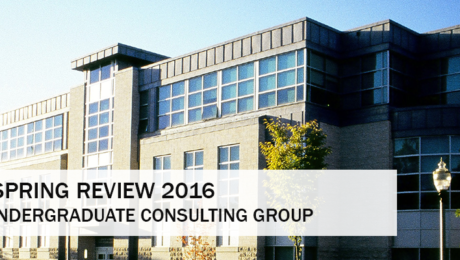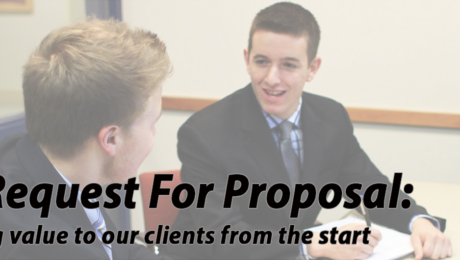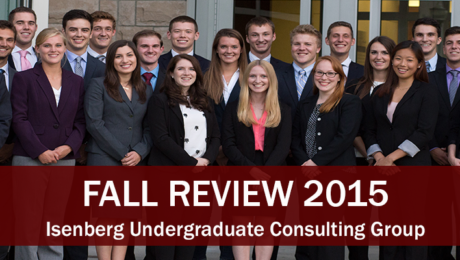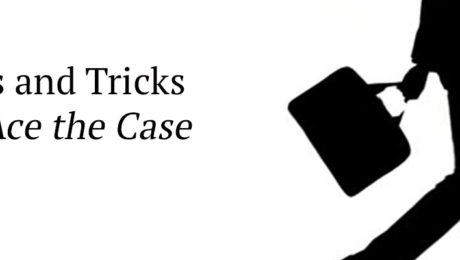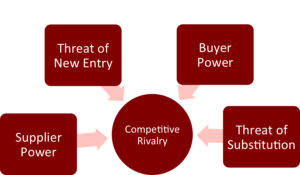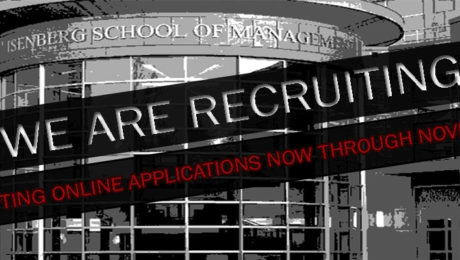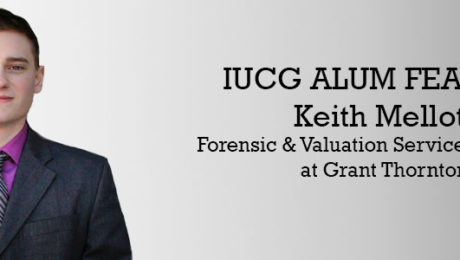Spring 2016 Semester Review
Please find the Semester Review below along with the option to download a pdf version.
- Published in Frontpage Article, Publication
Management Consulting from the Perspective of BCG Partner, Brian Roughan
Management consulting is a profession where thrill comes from solving a new, complex problem every single day. This insight came from UMass alumnus Brian Roughan, a current Partner and Managing Director at Boston Consulting Group (BCG). In late March, Mr. Roughan spoke to IUCG and other top clubs about his journey from UMass to BCG, the telecommunications industry, and strategies to break into consulting.
Graduating from UMass in 1998 with a degree in Accounting, Roughan worked for Arthur Andersen in technology consulting. In 2005, he completed his MBA at MIT Sloan School of Management. Since then, he has worked at BCG where he is now a Partner in the Technology, Media & Telecommunications Practice. Currently, this practice is one of BCG’s largest growth engines and is a significant aspect of their global experience with 2,500 cases worldwide in the past five years.
Roughan opened the presentation with a quote from BCG founder, Bruce Henderson,
“Consulting is the most improbable business on earth: Successful firms hiring people who are fresh out of school to tell them how to run their business, and paying millions for the advice…What are you doing for them that makes this possible?”
Not uncommonly, clients with thirty plus years of experience seek help from consultants who have a third or less of that experience; therefore it is essential that the content carry superior value. As a result, it is essential to gather “ideas that win.” Although BCG is a global company, each office only has about 50-200 consultants, which drives a team-oriented environment. This philosophy is also demonstrated by the diamond structure that all BCG practices adhere to: one partner, one project leader, two consultants, and one associate.
The projects that Mr. Roughan focuses on are related to the telecommunications industry. One of the more notable cases he worked on was the launch of a groundbreaking artificial intelligence product. It was up to his team to decide how the client should best introduce such a powerful product into the marketplace. They begun by surveying a multitude of potential markets in order to understand potential adoption ad profitability. The outcome was remarkable in that Roughan was able understand how a breakthrough technology could be brought to market as a solution. The question continues: What is AI’s role in the world, and how is it impacting society and business as a whole? Roughan constantly analyzes the growing stream of emerging technology trends and looks to the future.
Roughan also provided the group with tips on life after graduation, and the ideal path to BCG. He stressed the importance of taking the GMAT early and striving for a top 10% score, which would open up top grad school possibilities. Another crucial component to landing an interview at top firms is mastering the case interview. Not only are case interviews the preferred method of screening candidates for several top firms, but they also act as great skill generators. Working through the problem in a logical and systematic way allows the individual to develop their critical thinking skills to ultimately extract value from the situation. In addition, the ability to decompose a problem into smaller components, while bringing in a unique and creative perspective is another fundamental component of an elite job candidate.
Collaborate. Solve. Accelerate. The values that we strive for within IUCG are some of the same values that are lauded in top tier firms. Recruiting life long learners—members who are dedicated to constantly improving their knowledge, is a similarity seen in both Boston Consulting Group and IUCG. The egalitarian structure of BCG promotes a feedback loop, which provides constant performance evaluations to consultants. Informal reports, formal reviews, and counselor meetings ensure constant development within the organization. Similarly, IUCG conducts an official review of our members each semester to affirm that the entire group is communicating effectively with one another and functioning to the best of our ability. IUCG core activities develop and grow the skills for success in consulting, such as case interview practice, research presentations, structured thinking, and real-world problem solving.
- Published in Publication
The RFP: Providing value to our clients from the start
The Isenberg Undergraduate Consulting Group is back and better than ever, with a major improvement that streamlines the preliminary stages of the relationship with a prospective client. For this semester, IUCG designed and implemented a “Request for Proposal” which allows both IUCG and the potential client to enter the engagement on the same page.
Located under the “Our Work” tab on the IUCG website, clients can select to begin their project inquiry. Below is a brief overview of our project selection process.

The addition of the RFP brings more structure and consistency to the project process which will increase the value for everyone involved. Some key aspects of this document are a general overview, employee information, the companies’ strengths and weaknesses, marketing tactics, finances, and project specifics and includes questions which allows the group to gain a better understanding of the company prior to the engagement. The RFP will be open and available for potential clients to submit, year round, however in order to be considered as a project, the RFP must be submitted at least 1 week prior to the start of the new academic semester. Once IUCG has received the RFP, and the scope and vision of the project aligns with the group’s vision, the client will meet with leadership and the project manager to better define the project. The group is confident that this new proposal system will only improve the quality of our work.
Our guarantee is that as the client, you have the final word. We believe that the quality of our work speaks for itself. Please check out our case studies about our previous engagements under the “Our Work” tab on our website.
Just as the group selects clients to work with each semester, our analysts and project managers undergo a rigorous, and highly competitive process to be join the group. From this pool of students, IUCG identifies the right team of analysts that fit your organization’s specific needs. Our internal development initiatives, which involves lectures from alumni who work at top firms, case work and technical development workshops, encourages all project members to continuously sharpen their skills.
IUCG’s culture is one of continuous improvement and development. It is in the nature of that culture to consistently improve processes like the RFP in order to provide the most value to clients as well as our members.
- Published in Publication
Fall 2015 Semester Review
Please find the Semester Review below along with the option to download a pdf version.
- Published in Frontpage Article, Publication
Standardizing Business Processes: A Necessity For Consistency
- Published in casestudy, Uncategorized
Shifting To E-commerce: A Business Model Built To Drive Sales
- Published in casestudy, Uncategorized
Tips and Tricks to Ace the Case
Thank you to everyone from the UMass community who applied to join IUCG for the Spring semester. For those of you interviewing this weekend, we have some quick tips for the case interview. Below you will find a selection of popular frameworks used to solve an array of cases, as well as links to some helpful resources. Study up, and good luck!
Profitability Framework
The profitability framework is considered one of the most popular frameworks, and is used when addressing a company that has issues with their bottom line.
Remember: Profit = Revenue – Costs
In a more holistic view: E(P=R-C)M, where E=economic conditions, P=profit, R=revenue, C=costs, M=market conditions
Revenue includes price per unit and number of units sold. Types of costs includes Fixed Costs (overhead and insurance) and Variable Costs (new machinery, packaging, raw materials, cost per unit, number of units, etc.)
Economic Conditions to keep in mind:
• Unemployment
• Strength of the Dollar
• Interest Rates
• Consumer Spending
Market Trends
• What are three year trends for this industry?
Note: Revenue can be further broken down by demographic, location, product line, etc.
Porter’s Five Forces
Are you trying to figure out where a company has room for growth? Are you looking into the company’s overall strategy regarding the creation of a new product? These are just two potential situations where Porter’s Five Forces will come in handy. Use this framework for a high level view of what your company’s strategy should be.
Supplier Power
• Number of suppliers
• Size of supplies
• Differentiation of inputs
• Your ability to substitute
• Switching costs
Threat of New Entry
• Time and cost of entry
• Specialist knowledge
• Economies of scale
• Cost advantages
• Technology protection
• Barriers to entry
Competitive Rivalry
• Number of competitors
• Quality difference
• Switching costs
• Customer loyalty
Buyer Power
• Number of customers
• Price sensitivity
• Size of each order
• Differences between competitors
• Bargaining leverage
Threat of Substitute
• Substitute performance
• Cost of change
IUCG’s 8 Case Commandments
- Pay attention to what the question asks
- Take notes
- Verify and ask clarifying questions
- Think before you speak
- Work the numbers
- Be coachable
- Close and summarize
- Don’t forget the original question
Below you will find some useful links relating to case interviews and how to prepare for them.
• McKinsey Interview Advice: http://www.mckinsey.com/careers/join_us/interview_prep
• Case Interview Prep from a former McKinsey Interviewer: http://www.caseinterview.com/case-interview-preparation
• BCG Interview Advice: http://careers.bcg.com/join/practice_cases.aspx
Feel free to do your own research, and good luck!
- Published in Publication
Join IUCG: Who We Are and What We Do
It’s the most wonderful time of the year—IUCG is recruiting Junior Analysts for the upcoming spring semester! IUCG is looking for creative and motivated students who are interested in getting real-world, hands-on project experience. Our members are intellectually curious and strive for excellence in all they do. Interested? Here’s a glance at who we are and what we do.
Who we are
IUCG was founded on the values: collaborate, solve, accelerate. We incorporate these values into every facet of the organization, from outside of the group on projects to within club meetings in development workshops. IUCG has fostered a culture of mentorship, where every member can learn from each other, and every member has something unique to offer the group. We constantly push to grow and develop both our members and the group as a whole. Every semester we strive to improve and innovate so that we can provide our clients with quality service and quality recommendations.
What we do
Currently in its fourth operational semester, IUCG has worked with a number of diverse organizations. Our members have provided IT solutions for small restaurants, restructuring for on-campus RSOs, and process improvement recommendations for UMass offices. These pro-bono consulting engagements provide benefits for both IUCG members and IUCG clients; giving members the chance to add value to local organizations, and clients the opportunity to receive free assistance to improve their operations.
Within the organization, we focus on developing our members as individuals. Our weekly develop workshops are a platform for students to refine both their hard and soft skills. This semester we held a small internal case competition, taught the basics of process mapping in Visio, covered the ins and outs of LinkedIn, just to name a few. IUCG is an organization that values intellectual curiosity and the desire to learn. The development workshops complement that desire by providing our members with the opportunity to learn new skills outside of the classroom.
Join IUCG
Do you have a propensity for creative thinking and problem solving? Do you want the opportunity to add value to both the Isenberg and Amherst communities?
IUCG is accepting applications from now until November 15 at 5 p.m.
Apply online: isenbergconsulting.org/membership.
- Published in Publication
Residential Reallocation: Making Moves Towards Efficiency
- Published in casestudy, Uncategorized
Alum Feature: Keith Mellott
Alum Feature: Keith Mellott, Class of 2015
Q & A with Forensic & Valuation Services Associate at Grant Thornton LLP
Why were you drawn to consulting?
I have never thrived in consistent, predictable environments. I love dynamic situations that keep me “on my toes” and force me to constantly learn new skills. Consulting is a perfect fit for somebody like me; it provides the opportunity to work within drastically different industries and acquire skills that I never would have in a more controlled environment.
What are three words to describe yourself and how did those characteristics contribute to your success in finding a job?
Curious, energetic, and motivated. Consultants are a different breed. It takes one to know one. The hours can be demanding and the intellectual challenges strenuous. During the job hunt, it is critical to convey a genuine desire to learn and a willingness to work.
Why did you choose to start your career at Grant Thornton?
Grant Thornton is an exceptional company. Their reputation speaks for itself. The great thing about starting a career at GT is the options you have. There is plenty of room for internal upward mobility, but GT will also provide you with the technical skills and the credibility to pursue advanced degrees at top schools.
Can you tell us about your role in Forensic & Valuation Services?
I work within the Forensic, Investigate, and Dispute Resolution Services department. Our department offers a variety of services. On a basic level, we investigate cases of financial fraud and provide expert financial and economic analysis during the litigation process. It involves a lot of data analytics, economic valuation, and forensic accounting.
What types of projects are you working on?
While I can’t speak too much about specifics, I can say that I am working on three very different projects! That’s my favorite part about my job; I am not restricted to one task or function.
What has been the biggest challenge for you while at GT?
My biggest challenge has not been related to GT itself. The transition from a college lifestyle to a working lifestyle should not be taken lightly. My daily routine requires more discipline and structure than it did in college. I certainly did not wake up at 6 in the morning during the school year! I have slowly adapted to the point where I am now accustomed to sometimes having to work 12-14 hours in a day and still accomplishing things outside the office, such as going to the gym or finding time for hobbies/interests.
How do you feel IUCG helped prepare you for work at GT?
The client-consultant relationship is at the core of every consulting firm’s success. IUCG taught me how to foster these relationships and maintain them throughout the course of an engagement. The hands-on experience with real life projects is irreplaceable.
What advice do you have for students interested in consulting? What do you wish you had known?
Consulting is hyper-competitive. You need to approach your career goals the way professional athletes approach theirs. You should have objectives every day that you strive to accomplish. Personally, I make a 5-year plan, a 3-year plan, a 1-year plan, a monthly plan, a weekly plan and a daily plan. You need to have some sort of vision for your future (even if it’s a rough outline) and you need to constantly monitor your progress towards your goals.
Final thoughts?
Learn how to use all the software you can! I cannot stress that enough. If you are masterful at Excel or programs like Stata, you are going to have an advantage over the competition. I would also advise learning at least one computer programming language. I started with R, which focuses on statistical and data analysis. Figure out what kind of consulting you want to do and research which programming languages will be most helpful for that type of work. Finally, the last piece of advice I can offer for undergraduates hoping to one day work in consulting is to forge as many professional relationships as possible in all kinds of industries. You never know who you might need to call upon for information or a favor!
- Published in Publication

